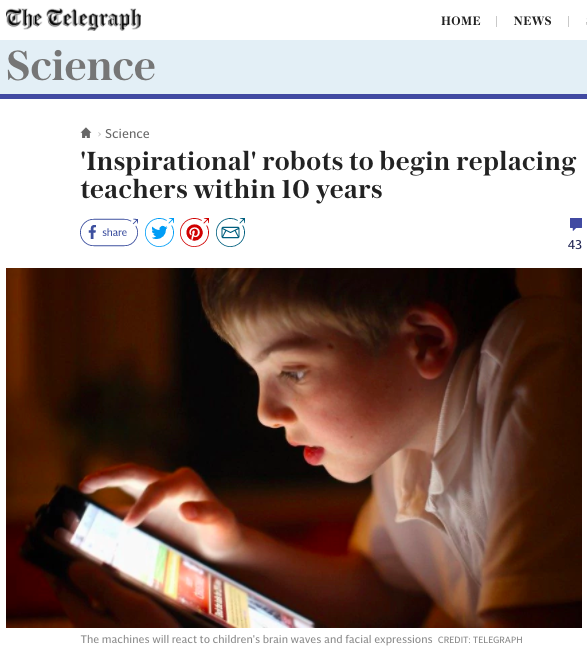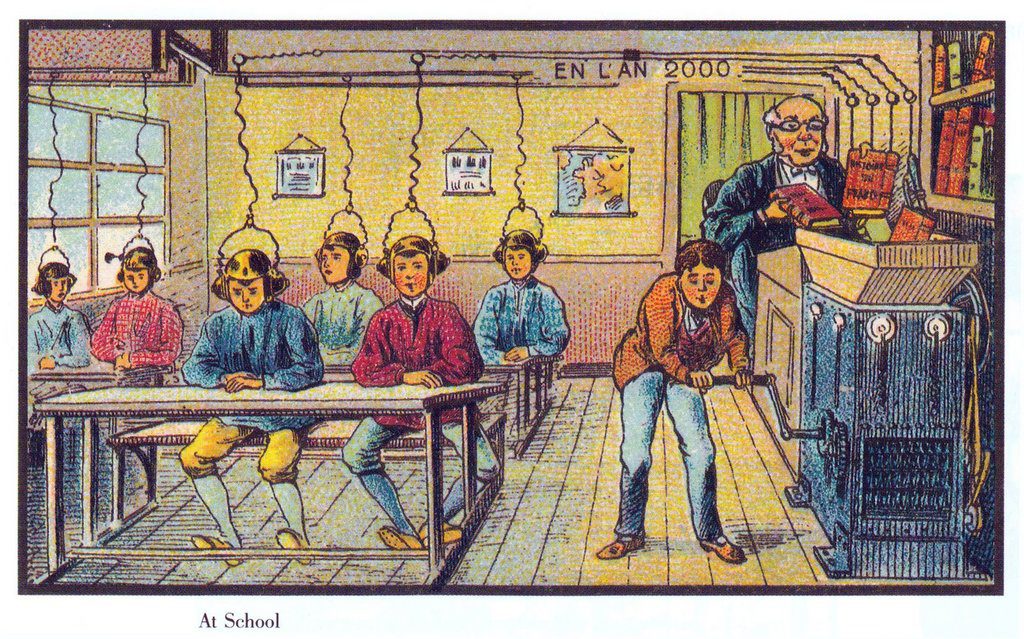
Over the past 25 years that I have been involved in education, I have seen so many claims that this or that technology will begin to replace teachers in “X” number of years. Years ago, my initial response to these types of articles was humor and occasional annoyance because I know from first-hand experience that there is much more to learning than just delivery of content. Unfortunately, authors of most of these types of articles are wrongly assuming that learning just involves the delivery of content and then the regurgitation of that content by the student. This commonly held and very naive understanding of how we learn goes back for centuries. If you look at the notion of the Nuremberg Funnel from the 17th century that is depicted in this image/stamp you will see that this idea of pouring information or content into the brains/heads of our students is a very old idea.

The 19th-century commercial artist Jean-Marc Côté created a series of picture cards as inserts that were intended to depict how life in France would look in a century’s time. The education card depicts the notion of pouring information directly into the student’s minds.

While some may see this as an early prediction of the audiobook the notion of pouring information into the learner’s minds is the focus of the image and is at the heart of the problem with these types of depictions/predictions. Before I focus on what I believe is the primary issue I need to acknowledge that there is a very long history of unrealistic claims of how technology would reform education. The following three contemporary authors have documented how schools have failed to effectively use technology to enhance learning. Larry Cuban’s Teachers and Machines: The Classroom Use of Technology Since 1920, addresses how the potential of film, radio, TV, and computers has been wasted in the classroom. Todd Oppenheimer’s The Flickering Mind: Saving Education from the False Promise of Technology expands on Cuban’s work and further reveals that the creative power of computers has been squandered due to their use as standardized testing tools. Both these authors acknowledge the potential and power of technology but show how we have failed to leverage that power for learning.
In the timeline History of Teaching Machines Audrey Watters points to the list of teaching machines that have been invented, patented, and promoted as time-saving solutions to the problems of education. We see major figures like Thorndyke, Skinner, and even Neo from the movie Matrix promising a future of instant learning. In her discussion of the dystopian future portrayed in the Matrix Watters questions how we value the process of learning when we so often want to supplant it with something that is, fast, cheap and instant. She argues that this desire for instant learning will continue to resurface time and time again and in the more recent stages of her timeline she points to Kahn Academy and MOOCs as the most recent iterations of the teaching machine.
This brings me back to the heart of the matter. Are we using technology as a tool to help make meaningful connections and to address the challenges of tomorrow or are we just using technology to deliver content and confirm that the student can regurgitate that content? There was a time not so long ago when getting access to information was the greatest challenge. We only have to look back a few years to a time when the Internet didn’t exist and we had to go to the library or other repositories of information to get at the content. I am not that old but I can recall a time in the 1960s when a set of encyclopedias was one of the most important purchases a rural family could make; I grew up searching those books for all kinds of answers. In the last 15-20 years the explosive growth of the Internet and more recently the ease with which we can find information with Google, YouTube, or other search tools and then can share that information on blogs, social media, and in so many other ways has changed the way we need to view our challenges regarding information. The greatest challenge of the industrial age was accessing information and now that we have moved into the digital information age our greatest challenge or problem is assessing information. This means we need to reassess our primary role or job as teachers.
If I imagine my primary job as a teacher is to serve information, am I helping solve the current informational problem or do I make it worse?
And given the vast complexity of the informational network, if I insist on my centrality and authority, does that establish or harm my credibility as a teacher?
If assessing information – and the wisdom & experience that this requires – is the central challenge of the current informational age, then are teachers more or less necessary?
Depending on how you answer this question should determine if your role as a teacher can easily be replaced by a computer or an inspirational robot. If you believe that your primary job is to deliver information to your students then these predictions will come true sooner than you expect. Technology is at the point where the delivery of information and the assessment of the reception of that information through some form of standardized test is already happening and can easily be automated. If you are a teacher that practices content delivery as the primary way to prepare your students for standardized tests then you can easily be replaced by a computer, robot, or other technology.
If you are a teacher who believes it is your responsibility to inspire your learners and to help them assess information and make meaningful connections by creating significant learning environments (CSLE) in which you give your learner choice ownership and voice through authentic (COVA) learning opportunities it will be impossible to replace you with technology. Furthermore, if you hold to the CSLE+COVA approach then you are not afraid of technology and can put technology in its proper place by using it to enhance the learning environment.
Before you breathe that sigh of relief that your teaching job is secure because you believe in the student-centered rhetoric of Dewey and other constructivists you may want to have a look at your practice. Are you talking the talk of Dewey but walking the walk of Thorndyke? Along with the long history of misapplying technology in education, we also have a long history of using the constructivist or progressive rhetoric of Dewey but practicing the behaviorist methods of Thorndyke’s standardized testing (Labaree, 2006).
If you really don’t want to be replaced by an inspirational robot then you need to not only talk the talk of Dewey but walk the walk. Does your practice match your rhetoric? If it doesn’t what are you doing about it?
References
Bodkin, H. (2017, September 11). “Inspirational” robots to begin replacing teachers within 10 years. The Telegraph. Retrieved from http://www.telegraph.co.uk/science/2017/09/11/inspirational-robots-begin-replacing-teachers-within-10-years/
Hill, D. J. (2012, October 15). 19th-century French artists predicted the world of The future in this series of postcards. Retrieved October 3, 2017, from https://singularityhub.com/2012/10/15/19th-century-french-artists-predicted-the-world-of-the-future-in-this-series-of-postcards/
Labaree, D. F. (2005). Progressivism, schools and schools of education: An American romance. Paedagogica Historica, 41(1–2), 275–288. https://doi.org/10.1080/0030923042000335583
Nuremberg Funnel. (2017, January 6). In Wikipedia. Retrieved from https://en.wikipedia.org/w/index.php?title=Nuremberg_Funnel&oldid=758530021
Watters, A. (2016, March 2) The allure of ‘Matrix-Style Learning.’ Retrieved from http://hackeducation.com/2016/03/02/matrix
Watters, A. (2016) History of teaching Machines. Retrieved from http://teachingmachin.es/timeline.html































The teacher is challenged with a creative and critical process as well, so I will expect the facilitators to assume a dialectic/historical style in communication, and reflect on the curriculum design about the authentic teaching opportunities needed in this transformational experience of both agents of the educational process. After all, consistency among learning outcomes, activities of learning/teaching, use of technology, and the assessment process is the main element to a systemic and effective Achieved Curriculum.
I can see the other side of the coin, let’s put it that way; in which, the facilitators looking to engage their participants in a conscious collaboration, perceive the need for authentic teaching experiences consciously, and not limited to the learning aspect of the educational process and the learners’ performance; that, I believe, can only strengthen the Intended Curriculum, as well as for the Implemented Curriculum; overall, the Achieved Curriculum is the equity capital for the authentic process of learning; therefore, for both of its agents.
Would this make it for a constructivist approach to teaching as well?
While I follow your thinking process with respect to a teacher working toward the Implemented Curriculum I think we must always be careful to ensure that our primary goal is for the student to do the learning and make meaningful connections which are at the core of a constructivist approach. Whenever I see a phrase like “authentic teaching experiences” I will question whether this is emphasizing learning or teaching. As a bit of a constructivist idealist, I would suggest that a teacher-centered and teacher-controlled perspective usually will not be constructivist.
I agree with your ideas; however, i understand the process of learning from a dialectic perspective and not limited to one side of it; perhaps, my English does not help me to express clearly what I meant with authentic teaching experiences. I was aiming to the need of consistency in the educational process, teaching/learning process. I understand that authentic learning experiences are the core of a constructivist approach to education, and still, authentic teaching experiences will complement the same feature on the learning side. How can you give anything that you do not have, will be the idea of my comment above. It is not about being a protagonist of the show, or teacher-centred, is more about being consistent, how can my teaching strategies comply with authentic learning experiences? The need to be creative hits both sides of the educational process, I think of a facilitator that wants to deliver “authentic learning experiences” must design “authentic teaching experiences”, not to be teaching centred, but to address authenticity in both, teaching and learning, understanding that the most important aspect of it is having the learners as the creators of a new perception of reality after they participated in a constructivist experience. I will say it is emphasising learning upon teaching. Thanks for following up on my comments Dwayne, always constructive.
When you focus on designing authentic teaching experiences you have no choice but to focus on the teaching. Your focus on teaching constrains you to all the presuppositions that come with teaching. You can break free from the teaching emphasis and focus on creating a significant learning environment in which you give your learners choice, ownership, and voice through authentic learning opportunities. The difference is that you focus on designing learning through the learning environment and learning experiences in that environment as opposed to designing teaching experiences. Some may argue this is semantics but it really isn’t. Consider the following:
Teaching, or to teach, is to impart knowledge or skill to someone by instruction or example; or to give lessons in a subject. In contrast, learning, or to learn, is coming to know something, to acquire knowledge or to find something out. Therefore a teacher is a person who imparts knowledge or skill through instruction or example while a learning facilitator is one who creates an environment in which someone can come to know something, acquire knowledge, or to gain information and experience.
The significance in these definitions and the realization of what happens when we teach as opposed to facilitate learning is that a teacher by definition is focused on themselves and their ability to impart knowledge. The saying “sage on the stage” is extremely appropriate in this context. In contrast, a learning facilitator is focused on the learner and on creating a desirable environment in which the learner can come to know, acquire knowledge or make a meaningful connection–“a guide on the side.”
I got it now, and I will rephrase my statement, it has to be “authentic teaching techniques/strategies” that will make more sense to what I am thinking about the subject.
Does that make more sense to you as well?
thank you Dwayne.
Fair enough. I think we have to find a balance between idealistically being student-centered and recognizing that the teacher still has to use strategies in the learning environment.
When you said assessing information the article hit the spot, I think as teachers the role of facilitating authentic Learning opportunities is linked to the question of, is this data really informing me, or misinforming me? The accessibility to “information” does not guarantee the proper use of it, let’s move further ahead, it isn’t about only assessing the information in terms of validity and reliability, I think is more about, are we equipped to manage the “information” in order to apply it on a creative way to the personal and social benefit? this last question involves the process of education that each individual has been exposed to, and at the next level, to the knowledge each individual has constructed based on the education he has received. yes, authentic learning opportunities on our roles as facilitators are the basement for a solid educational process and a strong knowledge bagage, which prepare the individuals to access information with a meaningful connection to his/her own preception of reality. Great reading, illustrative to say the less.
I am glad to hear that the ideas in this post “hit the spot”. Just having access to information isn’t enough, we need to help learners manage, evaluate and then use that information to make their own meaningful connections. Using authentic learning opportunities is an effective way to help learners to become good synthesizers of information rather than consumers. Thanks for the insightful comments!
Hi Dwayne,
Great article on how to rethink our roles as educators. I liked the way you explained blending CSLE with COVA as it gives the learner a differentiated approach to learning which is suitable to their needs and yields greater outcomes.
I have always proposed or argued that we need to create significant learning environments in which we give our learners choice, ownership, and voice through authentic learning opportunities. This helps us help our learners make the shift to a learner’s mindset.